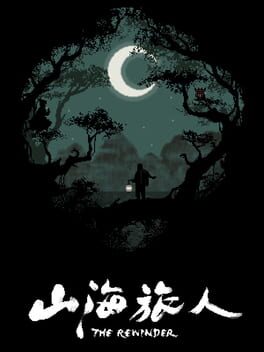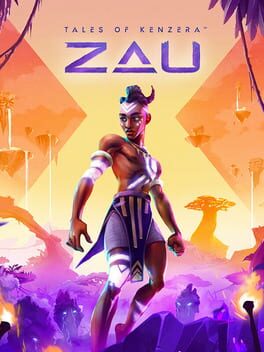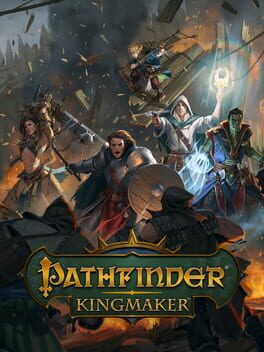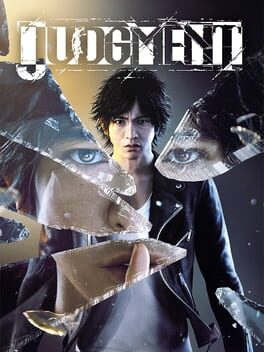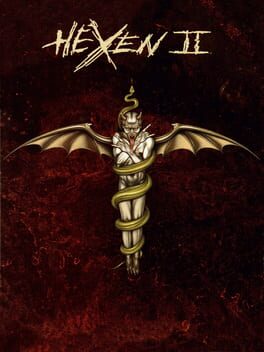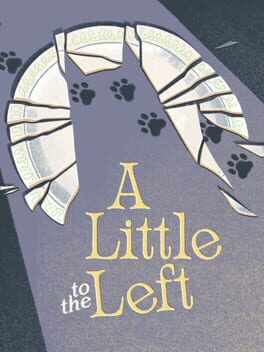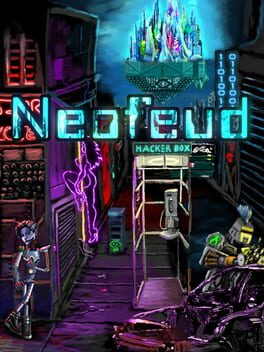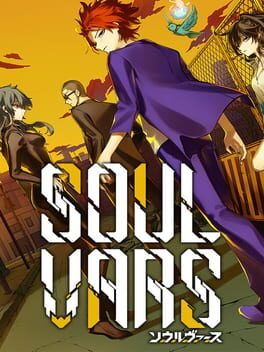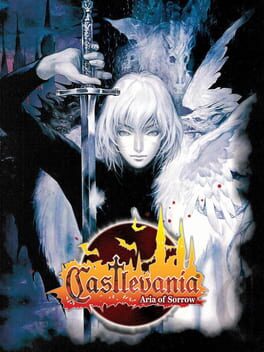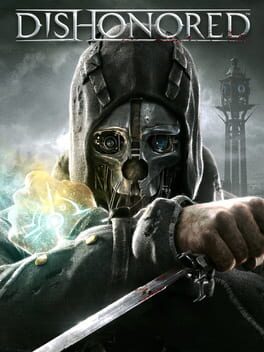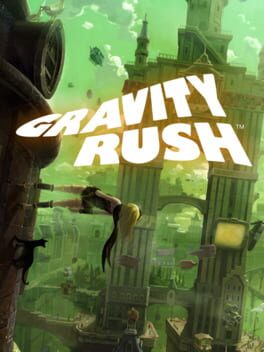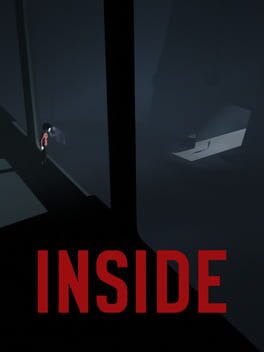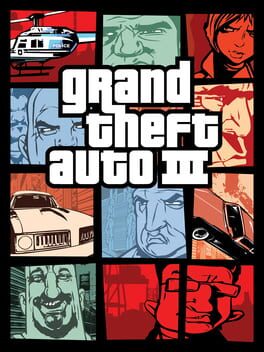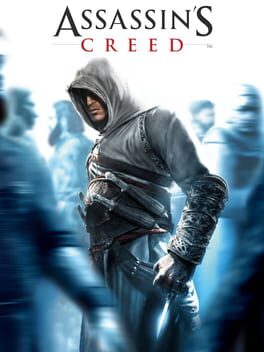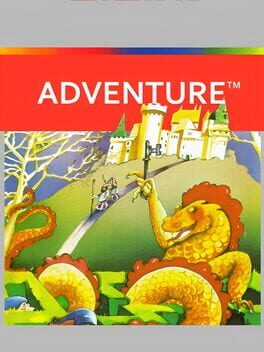jademonkey
15 reviews liked by jademonkey
The Rewinder
2021
Very concise and well-crafted experience. The puzzles were engaging without being too difficult, the narrative had its twists and surprisingly emotional moments. The game respects your time and cut on unnecessary backtracking or exploration. The length was just perfect - not too short and didn't overstay its welcome.
But perhaps the best aspect of The Rewinder is its setting - it's heavily based into Chinese folklore, its mythology and deities. The game deals with this in a very digestible and approachable way, with tons of glossary entries and expositive dialogue which don't feel out of place and helps us (speaking as a westerner myself) get immersed into its rich lore. I love when a media piece allows us a window into the culture and customs of a different people.
The game oozes passion and feels a labor of love. Big props to Misty Mountain Studio!
But perhaps the best aspect of The Rewinder is its setting - it's heavily based into Chinese folklore, its mythology and deities. The game deals with this in a very digestible and approachable way, with tons of glossary entries and expositive dialogue which don't feel out of place and helps us (speaking as a westerner myself) get immersed into its rich lore. I love when a media piece allows us a window into the culture and customs of a different people.
The game oozes passion and feels a labor of love. Big props to Misty Mountain Studio!
Tales of Kenzera: Zau is a really smartly made game. It takes Ori and the Blind Forest as a basis, iterates a bit on the mechanics, and uses it to tell a heartfelt and touching story explored through an authentic and interesting worldview. I liked my time with it quite a bit despite some of its rough edges.
Zau looks amazing and delivers its straightforward story of loss and acceptance extremely well. This is a colorful, vibrant world and exploring it is a ton of fun. You get glimpses of a future Africa that is inspiring and cool while maintaining obvious cultural influences, set alongside an examination of a tribal belief system that is portrayed masterfully without becoming preachy or self-absorbed. All of that rolls directly into the two main characters dealing with the loss of a father and their agency in the world.
This is where the game shines the strongest for me. Everything about it from the voice acting to the enemy and environment design showcase the team's dedication to telling this story in exactly this way.
The world design here is very linear. It hardly feels much like a metroidvania, but I didn't feel like I was missing anything in that regard. Each area has a couple of keys for you to collect to unlock a door, a new ability to gain, and a boss to fight. A lot of the narrative is smartly driven through Zau's interactions with the people he meets and the problems they have, so the linear nature of the game works very well, honestly. I found these simple stories compelling and I really like that they tie directly into Zau's own struggle of dealing with the death of his father in interesting and insightful ways.
Playing Tales of Kenzera: Zau, it is obvious that it is heavily influenced by Ori, with a couple of interesting twists. The main mechanic here is the ability to switch between two forms. This isn't an Ikaruga-style polarity shift though, it is more like two different move sets you swap between depending on the situation. Though it can be a bit confusing, I do like this mechanic. It feels very awesome to freeze an enemy, dash into them and swap for a melee combo, then dash back out to finish them with a ranged barrage, but the times this is possible are less common than I would like.
The combat system needs a couple of things to enable a bit more control and enemies that are more readable and predictable to really shine. A Moon-stance gap closer that automatically switches you to Sun and the reverse for Sun-stance would have gone a long way for me to make these Shaman powers feel fluid and like the dance the narrative of the game describes it as. Enemies have uninterruptable attacks without any real tells and some enemy types are so mobile and have such large invulnerability windows that it feels like the only way to successfully engage with them is to abuse freeze and kill them from range.
Beyond the base combat, you gain a couple of specialized ranged attacks, a grappling hook (that is sorely underutilized), and some other movement focused abilities. These all feel pretty good to gain and are used in fun, if predictable ways as you progress. Unfortunately, most of these new abilities are relegated to the areas you find them in. Even abilities like the grappling hook, which would make the world much more fun to traverse, feel like they are just forgotten about once you finish the area they are introduced in. It feels like a real missed opportunity, unfortunately.
A bit of control jank means Zau always feels slightly out of control (this DOES fit his characterization, but doesn't feel good) and you often end up with your dashes or attacks not executing as expected. Similarly, I never really felt like the abilities were as reliable as I wanted them to be, simply because of control delays or failed inputs. You can occassionally get into a state where the input stops responding or just fails to work.
This is all fairly minor and didn't detract too much from the experience, however.
For Surgent Studio's first effort, Tales of Kenzera: Zau is really solid and fun. Similar to Kena: Bridge of Spirits, it is clear there is room for improvement, but Zau exposes its strengths much more effectively and tries for some interesting gameplay iteration. It is worth playing through this just for the very effectively expressed narrative, but if you are a fan of Ori and the Blind Forest or other side-scrolling adventure games, you will definitely find a lot here.
Zau looks amazing and delivers its straightforward story of loss and acceptance extremely well. This is a colorful, vibrant world and exploring it is a ton of fun. You get glimpses of a future Africa that is inspiring and cool while maintaining obvious cultural influences, set alongside an examination of a tribal belief system that is portrayed masterfully without becoming preachy or self-absorbed. All of that rolls directly into the two main characters dealing with the loss of a father and their agency in the world.
This is where the game shines the strongest for me. Everything about it from the voice acting to the enemy and environment design showcase the team's dedication to telling this story in exactly this way.
The world design here is very linear. It hardly feels much like a metroidvania, but I didn't feel like I was missing anything in that regard. Each area has a couple of keys for you to collect to unlock a door, a new ability to gain, and a boss to fight. A lot of the narrative is smartly driven through Zau's interactions with the people he meets and the problems they have, so the linear nature of the game works very well, honestly. I found these simple stories compelling and I really like that they tie directly into Zau's own struggle of dealing with the death of his father in interesting and insightful ways.
Playing Tales of Kenzera: Zau, it is obvious that it is heavily influenced by Ori, with a couple of interesting twists. The main mechanic here is the ability to switch between two forms. This isn't an Ikaruga-style polarity shift though, it is more like two different move sets you swap between depending on the situation. Though it can be a bit confusing, I do like this mechanic. It feels very awesome to freeze an enemy, dash into them and swap for a melee combo, then dash back out to finish them with a ranged barrage, but the times this is possible are less common than I would like.
The combat system needs a couple of things to enable a bit more control and enemies that are more readable and predictable to really shine. A Moon-stance gap closer that automatically switches you to Sun and the reverse for Sun-stance would have gone a long way for me to make these Shaman powers feel fluid and like the dance the narrative of the game describes it as. Enemies have uninterruptable attacks without any real tells and some enemy types are so mobile and have such large invulnerability windows that it feels like the only way to successfully engage with them is to abuse freeze and kill them from range.
Beyond the base combat, you gain a couple of specialized ranged attacks, a grappling hook (that is sorely underutilized), and some other movement focused abilities. These all feel pretty good to gain and are used in fun, if predictable ways as you progress. Unfortunately, most of these new abilities are relegated to the areas you find them in. Even abilities like the grappling hook, which would make the world much more fun to traverse, feel like they are just forgotten about once you finish the area they are introduced in. It feels like a real missed opportunity, unfortunately.
A bit of control jank means Zau always feels slightly out of control (this DOES fit his characterization, but doesn't feel good) and you often end up with your dashes or attacks not executing as expected. Similarly, I never really felt like the abilities were as reliable as I wanted them to be, simply because of control delays or failed inputs. You can occassionally get into a state where the input stops responding or just fails to work.
This is all fairly minor and didn't detract too much from the experience, however.
For Surgent Studio's first effort, Tales of Kenzera: Zau is really solid and fun. Similar to Kena: Bridge of Spirits, it is clear there is room for improvement, but Zau exposes its strengths much more effectively and tries for some interesting gameplay iteration. It is worth playing through this just for the very effectively expressed narrative, but if you are a fan of Ori and the Blind Forest or other side-scrolling adventure games, you will definitely find a lot here.
Pathfinder: Kingmaker has some cool ideas and the systems are super intricate, but it is all pulled down by repetition, length, and the cruft-filled nature of the Pathfinder rules.
This plays like a classic real-time with pause game, though I played it in turn-based mode (I don't really see how real-time can work with some of these abilities... Magus would just not be functional, right?). It is tactical and fun when it is balanced, but difficulty swings pretty wild in this game. Many encounters are overly difficult and extremely punishing for un-optimized characters. Pathfinder's prevalence of spells and abilities that do semi-permanent ability damage or full CC effects that last 10+ rounds make the game feel super unfair and pointless.
The combat is also very janky in certain ways. There are times when your actions are unclear and inputs get eaten, resulting in missed opportunities. The extreme complication of the pathfinder rules also don't lend themselves to this very much at all, since many of the options and benefits of certain abilities are basically wasted or impossible to use.
When it is working and kept fairly simple, it is still very interesting and fun, however.
The Kingmaker portion of this game is a kingdom management simulation with some interesting ideas, but not enough to really hold my attention. You can assign advisors to do events for you, but everything takes an extreme amount of time (presumably to encourage you to go out exploring while your advisors are doing things?) for very little reward. There are also hidden punishments for missing events and the amount of resources you can put into this mode is extremely limited, reducing the actual choices it feels like you can feasibly make.
Pathfinder looks good, using the style of the tabletop game to good effect. I like that it is distinct from D&D while still having a classic fantasy feel. I definitely had some random framerate issues while playing, though they didn't negatively impact the experience too much.
Character building in Pathfinder is a direct implementation of the Pathfinder rules, which would be cool if the Pathfinder rules didn't have so much unnecessary jankyness and cruft to them. The TTRPG feels like a couple of character ideas with a ton of (really boring, terrible) feats to band-aid over basic problems with the system or destroy any class uniqueness and this holds true for Kingmaker. There isn't much reason not to take the same basic set of feats for every character, most of which are astoundingly unexciting (Weapon Focus!? GREATER Weapon Focus!?!?).
It can still be fun initially to pick a character and plan out how you want to build them, but it eventually broke down pretty hard for me.
Pathfinder is HUGE. There is a map you can explore as if it were a hex crawl, with events and locations scattered throughout. Most of this is unconnected to the main story, however, and eventually started just being busy-work. Everything in the game just takes a very long time to do, from waiting for your kingdom events to happen, to traveling to your current destination. It is realistic, but definitely not fun.
I did still get some entertainment out of this game -- choosing from the different classes, building your character, and combat are all fun at first. The extreme length and lack of depth and variety in both the combat and kingdom management eventually just made me lose interest with the Pathfinder feat system being the final nail in the coffin for me.
This plays like a classic real-time with pause game, though I played it in turn-based mode (I don't really see how real-time can work with some of these abilities... Magus would just not be functional, right?). It is tactical and fun when it is balanced, but difficulty swings pretty wild in this game. Many encounters are overly difficult and extremely punishing for un-optimized characters. Pathfinder's prevalence of spells and abilities that do semi-permanent ability damage or full CC effects that last 10+ rounds make the game feel super unfair and pointless.
The combat is also very janky in certain ways. There are times when your actions are unclear and inputs get eaten, resulting in missed opportunities. The extreme complication of the pathfinder rules also don't lend themselves to this very much at all, since many of the options and benefits of certain abilities are basically wasted or impossible to use.
When it is working and kept fairly simple, it is still very interesting and fun, however.
The Kingmaker portion of this game is a kingdom management simulation with some interesting ideas, but not enough to really hold my attention. You can assign advisors to do events for you, but everything takes an extreme amount of time (presumably to encourage you to go out exploring while your advisors are doing things?) for very little reward. There are also hidden punishments for missing events and the amount of resources you can put into this mode is extremely limited, reducing the actual choices it feels like you can feasibly make.
Pathfinder looks good, using the style of the tabletop game to good effect. I like that it is distinct from D&D while still having a classic fantasy feel. I definitely had some random framerate issues while playing, though they didn't negatively impact the experience too much.
Character building in Pathfinder is a direct implementation of the Pathfinder rules, which would be cool if the Pathfinder rules didn't have so much unnecessary jankyness and cruft to them. The TTRPG feels like a couple of character ideas with a ton of (really boring, terrible) feats to band-aid over basic problems with the system or destroy any class uniqueness and this holds true for Kingmaker. There isn't much reason not to take the same basic set of feats for every character, most of which are astoundingly unexciting (Weapon Focus!? GREATER Weapon Focus!?!?).
It can still be fun initially to pick a character and plan out how you want to build them, but it eventually broke down pretty hard for me.
Pathfinder is HUGE. There is a map you can explore as if it were a hex crawl, with events and locations scattered throughout. Most of this is unconnected to the main story, however, and eventually started just being busy-work. Everything in the game just takes a very long time to do, from waiting for your kingdom events to happen, to traveling to your current destination. It is realistic, but definitely not fun.
I did still get some entertainment out of this game -- choosing from the different classes, building your character, and combat are all fun at first. The extreme length and lack of depth and variety in both the combat and kingdom management eventually just made me lose interest with the Pathfinder feat system being the final nail in the coffin for me.
Judgment
2021
Had to let this one simmer a bit before dotting down my thoughts. Played nearly half of the 40hr game in two days which I would not recommend doing as some of the more meaty story nuances could be overlooked. Regardless this is a high quality Yakuza/Like a Dragon spin off and there is no denying that.
Bumping up the score half a star because honestly there is very little to complain about here and while I can't say with a straight face that I've enjoyed this game more than some of the Yakuza entries looking at it purely from a mechanical and objective stand point it is a pristine example of what makes RGG games so goddamn good.
Revised and improved combat from previous dragon engine games is certainly a highlight here. Pulling off the fissure release and the GOAT that is the Tiger drop hasn't felt so good before, also the much smoother integration of heat actions into your combos made each encounter not only more stylish and enjoyable to look at but also more satisfying to pull off. The overall balance of the fights were on the easier side with occasional high damage grab or a boss move putting you in the red. The mortal wound mechanic were you lose max HP if you get hit by guns or boss super moves is kinda pointless and an annoyance to deal with. You either use a medkit from a menu which takes a second to get it all back or go to a specific NPC for a check up which is neither that expensive nor does it happen often enough (I guess it depends on your dodging abilities) so it ends up feeling under baked.
Now the story is in a classic RGG fashion a rollercoaster to go through. A detective mystery involving court room drama, serial killings, conspiracy, betrayals and shocking revelations you know what you signed up for if you played any previous RGG games. Honestly it was really interesting to go through as more evidence is revealed and characters shift, perspective on previous facts change until it is all laid out on the table in the last third of the game with a finale waiting to wrap it all up. Saw someone say something along the lines of "this is the best RGG written story" and I would struggle to argue against that in terms of quality for sure.
The new cast is fantastic. Yagami, Kaito and Hamura being the clear highlights no surprise there since they get the most spotlight but even supporting cast like Sagiura, Saori and the merry band of Genda law office have some great scenes. It also feels like they turned up the dial a bit in terms of witty dialogue and humor in sub stories and in the main story as well even incorporating some modern slang which got more than a few chuckles out of me. The two main minigames, drone racing and VR gauntlet were quite interesting but even with a banger track playing for the VR minigame I didn't spend too much time with either.
The final fight was pretty rad as is the standard for these games a shame that the boss OST was a bit on the generic side, the goddamn baby face cane killer had an absolute fire of a track and the guy just shows up twice, refuses to elaborate and disappears. What's up with that? I was spoiled on the Lost Judgment final boss theme which is a shame in a way, but it only made me more pumped up to get to it in game.
So to recap awesome detective mystery story in Yakuza/LaD universe, great band of genuine, likeable and funny characters. Much improved combat with a discount DMC feel - yes the only reason I say that is because you can juggle enemies in the air and a sizeable quantity of entertaining side content.
Bumping up the score half a star because honestly there is very little to complain about here and while I can't say with a straight face that I've enjoyed this game more than some of the Yakuza entries looking at it purely from a mechanical and objective stand point it is a pristine example of what makes RGG games so goddamn good.
Revised and improved combat from previous dragon engine games is certainly a highlight here. Pulling off the fissure release and the GOAT that is the Tiger drop hasn't felt so good before, also the much smoother integration of heat actions into your combos made each encounter not only more stylish and enjoyable to look at but also more satisfying to pull off. The overall balance of the fights were on the easier side with occasional high damage grab or a boss move putting you in the red. The mortal wound mechanic were you lose max HP if you get hit by guns or boss super moves is kinda pointless and an annoyance to deal with. You either use a medkit from a menu which takes a second to get it all back or go to a specific NPC for a check up which is neither that expensive nor does it happen often enough (I guess it depends on your dodging abilities) so it ends up feeling under baked.
Now the story is in a classic RGG fashion a rollercoaster to go through. A detective mystery involving court room drama, serial killings, conspiracy, betrayals and shocking revelations you know what you signed up for if you played any previous RGG games. Honestly it was really interesting to go through as more evidence is revealed and characters shift, perspective on previous facts change until it is all laid out on the table in the last third of the game with a finale waiting to wrap it all up. Saw someone say something along the lines of "this is the best RGG written story" and I would struggle to argue against that in terms of quality for sure.
The new cast is fantastic. Yagami, Kaito and Hamura being the clear highlights no surprise there since they get the most spotlight but even supporting cast like Sagiura, Saori and the merry band of Genda law office have some great scenes. It also feels like they turned up the dial a bit in terms of witty dialogue and humor in sub stories and in the main story as well even incorporating some modern slang which got more than a few chuckles out of me. The two main minigames, drone racing and VR gauntlet were quite interesting but even with a banger track playing for the VR minigame I didn't spend too much time with either.
The final fight was pretty rad as is the standard for these games a shame that the boss OST was a bit on the generic side, the goddamn baby face cane killer had an absolute fire of a track and the guy just shows up twice, refuses to elaborate and disappears. What's up with that? I was spoiled on the Lost Judgment final boss theme which is a shame in a way, but it only made me more pumped up to get to it in game.
So to recap awesome detective mystery story in Yakuza/LaD universe, great band of genuine, likeable and funny characters. Much improved combat with a discount DMC feel - yes the only reason I say that is because you can juggle enemies in the air and a sizeable quantity of entertaining side content.
Hexen II
1997
Hexen II is pretty wild and unlike many other games in some fundamental ways, but it doesn't quite come together into something I particularly enjoyed.
There are hub worlds here with a heavy emphasis on puzzles consisting of finding keys or switches hidden in disparate areas and slowly unlocking more and more of the levels. This gives the game a pretty unique feel even though the weapons, enemies, and story don't really have much to say.
Hexen II diverges from Hexen in that it is actually a Quake-like, rather than a Doom-like. As you might expect this makes things more 3D, more hectic, and quite a bit more ropey. I have never really liked the feel of Quake and Hexen II doesn't do much to fix that, unfortunately. Enemies are incredibly lethal and by the end they are repeating the same few with more hit points. I didn't find much of interest by this point, and it just felt like a slog (I turned on godmode for the final level and I don't regret it).
World design here is strong at times, but inconsistent and the level design can be tedious. I enjoyed the first levels, Blackmarsh, quite a bit and they somehow manage to deliver on the feel of a medieval fantasy quest more completely than Hexen does. There are dungeons, granaries, and shops filled with enemies you can believe have just invaded and driven out the villagers.
Upon leaving this area, you go into a series of differently themed levels (Aztec, Egyptian, and Roman) that took me out of things pretty heavily. Only the Roman one really worked for me, but in general the "collect the random things in this area" nature of the game was just more apparent in these more abstracted areas that lacked the specific world-building of Blackmarsh.
Things do look pretty good, with each area having a distinct, identifiable motif and well done environment art. I do still like the look of pseudo 2D sprite based first person games better by this point in shooter history, but Hexen II looks fine for what it is.
There are four classes here that all seemed pretty interesting, though I only played as the Cleric. Weapons are more like Heretic than Hexen, with nothing to really push me to utilize their specific properties and no enemy behaviors to really mix things up.
We have a hammer, an ice wand that is basically like the mage weapon from Hexen, a staff that is a rocket launcher (phoenix staff from Heretic), and a sun staff that shoots a beam that passes through enemies and bounces off walls. The sun staff was definitely the most interesting, but usage in this game felt mostly like Heretic does -- I just used whichever I had ammo for without much consideration.
Items come back with the same problems. There are a ton of them. Keeping track of what they do is difficult. Scrolling through your massive list to use them is a futile endeavor.
Enemies don't have many unique behaviors, and all have so much health that I couldn't see any discernable weaknesses on display. This is the weakest part of Hexen II for me and the enemy design and interactions in general just feel too much like Quake for me to really enjoy it.
Interesting game that tries to do a bit more with the Hexen formula but largely didn't come through for me. If the whole game was at the quality level of Blackmarsh and the weapons and enemies were a bit more interesting I would have liked it much more I think.
There are hub worlds here with a heavy emphasis on puzzles consisting of finding keys or switches hidden in disparate areas and slowly unlocking more and more of the levels. This gives the game a pretty unique feel even though the weapons, enemies, and story don't really have much to say.
Hexen II diverges from Hexen in that it is actually a Quake-like, rather than a Doom-like. As you might expect this makes things more 3D, more hectic, and quite a bit more ropey. I have never really liked the feel of Quake and Hexen II doesn't do much to fix that, unfortunately. Enemies are incredibly lethal and by the end they are repeating the same few with more hit points. I didn't find much of interest by this point, and it just felt like a slog (I turned on godmode for the final level and I don't regret it).
World design here is strong at times, but inconsistent and the level design can be tedious. I enjoyed the first levels, Blackmarsh, quite a bit and they somehow manage to deliver on the feel of a medieval fantasy quest more completely than Hexen does. There are dungeons, granaries, and shops filled with enemies you can believe have just invaded and driven out the villagers.
Upon leaving this area, you go into a series of differently themed levels (Aztec, Egyptian, and Roman) that took me out of things pretty heavily. Only the Roman one really worked for me, but in general the "collect the random things in this area" nature of the game was just more apparent in these more abstracted areas that lacked the specific world-building of Blackmarsh.
Things do look pretty good, with each area having a distinct, identifiable motif and well done environment art. I do still like the look of pseudo 2D sprite based first person games better by this point in shooter history, but Hexen II looks fine for what it is.
There are four classes here that all seemed pretty interesting, though I only played as the Cleric. Weapons are more like Heretic than Hexen, with nothing to really push me to utilize their specific properties and no enemy behaviors to really mix things up.
We have a hammer, an ice wand that is basically like the mage weapon from Hexen, a staff that is a rocket launcher (phoenix staff from Heretic), and a sun staff that shoots a beam that passes through enemies and bounces off walls. The sun staff was definitely the most interesting, but usage in this game felt mostly like Heretic does -- I just used whichever I had ammo for without much consideration.
Items come back with the same problems. There are a ton of them. Keeping track of what they do is difficult. Scrolling through your massive list to use them is a futile endeavor.
Enemies don't have many unique behaviors, and all have so much health that I couldn't see any discernable weaknesses on display. This is the weakest part of Hexen II for me and the enemy design and interactions in general just feel too much like Quake for me to really enjoy it.
Interesting game that tries to do a bit more with the Hexen formula but largely didn't come through for me. If the whole game was at the quality level of Blackmarsh and the weapons and enemies were a bit more interesting I would have liked it much more I think.
A Little to the Left
2022
Markets itself as a cozy, zen organization game and is everything but. Some puzzles are extremely arbitrary to the point I found myself getting frustrated after having my answers get rejected without any indication whether I was close to the intended solution. The tips are terrible.
If you are looking for an actual relaxing game, steer clear of this one and go play Unpacking or Assemble With Care instead.
If you are looking for an actual relaxing game, steer clear of this one and go play Unpacking or Assemble With Care instead.
Dragon's Dogma II
2024
I think I had fun with this game, maybe a little disappointed after witnessing the "true ending" but overall short version is - if you liked DD1 you gonna like this because it's more or less the same game still got annoying and repetitive pawn dialogue a little less obnoxious than in the first game, the characters are still a cardboard cutouts with barely animated mouths spewing generic drivel, the side quests were designed 20 minutes before lunch break and the story resembles an upside down plate of spaghetti on a kitchen floor.
In two weeks since release we got a couple of patches improving framerate from an average of 37 fps in major settlements to 43 fps and an update adding "New Game" option in the main menu truly revolutionary 2024 gaming. It's funny that I thought after playing DD1 that the game was clearly an interesting vision not fully realized by it's creator due to time or monetary constraints but it turns out that's the kind of game they wanted to make all along since the sequel is hardly an improvement in any aspect over the original now featuring Denuvo and some random microtransactions that have no business existing.
Still it's hard not to have fun when you're plunging a ginormous greatsword into some poor ogre's cranium or calling a meteor shower on a goblin summer camp. DD2 does 1 thing really well -the combat and by god you're gonna be doing that a lot. There's a good variety of classes or vocations to choose from and they only get crazier and more overpowered as your rank increases. The different approach to combat for each vocation and constant drip feed of new abilities that unlock after each rank prevents the game from becoming stagnant.
So the main appeal of the game is still there strong as ever a radiant gem that is the action RPG combat placed on top of a shrine made out of cheap glue and recycled cardboard.
Fun drinking game - take a shot everytime someone says "aught" in the game and you can tell me how it went in the afterlife.
In two weeks since release we got a couple of patches improving framerate from an average of 37 fps in major settlements to 43 fps and an update adding "New Game" option in the main menu truly revolutionary 2024 gaming. It's funny that I thought after playing DD1 that the game was clearly an interesting vision not fully realized by it's creator due to time or monetary constraints but it turns out that's the kind of game they wanted to make all along since the sequel is hardly an improvement in any aspect over the original now featuring Denuvo and some random microtransactions that have no business existing.
Still it's hard not to have fun when you're plunging a ginormous greatsword into some poor ogre's cranium or calling a meteor shower on a goblin summer camp. DD2 does 1 thing really well -the combat and by god you're gonna be doing that a lot. There's a good variety of classes or vocations to choose from and they only get crazier and more overpowered as your rank increases. The different approach to combat for each vocation and constant drip feed of new abilities that unlock after each rank prevents the game from becoming stagnant.
So the main appeal of the game is still there strong as ever a radiant gem that is the action RPG combat placed on top of a shrine made out of cheap glue and recycled cardboard.
Fun drinking game - take a shot everytime someone says "aught" in the game and you can tell me how it went in the afterlife.
Neofeud
2017
Neofeud is as subtle and tactful as a pissed off hippo in a jewelry store to its both strength and detriment. The game’s allegory for robots/mutants as ethnic minorities, namely, African-Americans, as is utterly inelegant as David Cage’s robots in the back of the bus or Deus Ex’s “Aug Lives Matter”. One of the primary supporting characters is a jive talking gangbanger robot that would make those two racist Transformers from the Michael Bay movies tell him to tone it down. I don’t blame anyone from second guessing this game at first blush, it’s initially seems real ugly and abrasive. But what separates Neofeud from something as utterly po-faced and tone-deaf like Detroit: Become Human and alleviates its flaws it’s that it genuinely gets the genre and the themes it deals with.
Neofeud is probably the most actual cyberpunk game I’ve ever played. It dives harder into the ravages and inequalities of capitalism as well as how all the fancy tech in the world ain’t gonna fix capitalism’s problems or not even make the dystopia look cool than the vast majority of games that dabble in the genre. One great example of this is one of the early puzzles in the game is to DIY fix the protagonist, ex-cop turned social worker Karl Carbon’s, defective old cyborg arm that he can’t afford to upgrade. The dev is a native Hawaiian who worked as a social worker and you can tell straight away he was working from personal experience just with the opening scene at the social services building alone of an android lady pointing how the capitalist system is rigged to make sure the underclass is prevented from getting out of poverty. Even though Karl is an ex-cop, he as a character has an understanding of how fucked his society and is quick to point out injustice. One of the sections of the game has Karl do a CPS check on a robot foster home and you can have him let any infractions slide because he knows that the family is trying their best with the shit situation they’re given. He’s actually a pretty empathetic character when he easily could have been a snarky sociopath.
The puzzles are mostly pretty straightforward and logical, the solutions usually always being in the same room as the puzzle themselves. A good chunk of puzzle-solving is mainly just talking to other characters as well. There are some combat sections that are janky, but they’re few and aren’t too tricky.
The art is also something to get used to, it’s this cobbled together low-budget collage of weird but I honestly think it fits the game well. Really feels like it did what Cruelty Squad was trying to do years later, but better.
Neofeud is messy in a lot ways, in the writing, in the kind of janky gameplay, and in the art; but has a deft grasp of its themes and its understanding of American/capitalist society’s flaws and how completely unafraid it is to call them out in a leftist way. Its heart is fully in the right place and if you can stomach its idiosyncrasies you’re in for one of the most unabashedly anti-capitalist cyberpunk games around. Also the sequel is coming out soon and that looks legit rad. Definitely looking forward to it.
Neofeud is probably the most actual cyberpunk game I’ve ever played. It dives harder into the ravages and inequalities of capitalism as well as how all the fancy tech in the world ain’t gonna fix capitalism’s problems or not even make the dystopia look cool than the vast majority of games that dabble in the genre. One great example of this is one of the early puzzles in the game is to DIY fix the protagonist, ex-cop turned social worker Karl Carbon’s, defective old cyborg arm that he can’t afford to upgrade. The dev is a native Hawaiian who worked as a social worker and you can tell straight away he was working from personal experience just with the opening scene at the social services building alone of an android lady pointing how the capitalist system is rigged to make sure the underclass is prevented from getting out of poverty. Even though Karl is an ex-cop, he as a character has an understanding of how fucked his society and is quick to point out injustice. One of the sections of the game has Karl do a CPS check on a robot foster home and you can have him let any infractions slide because he knows that the family is trying their best with the shit situation they’re given. He’s actually a pretty empathetic character when he easily could have been a snarky sociopath.
The puzzles are mostly pretty straightforward and logical, the solutions usually always being in the same room as the puzzle themselves. A good chunk of puzzle-solving is mainly just talking to other characters as well. There are some combat sections that are janky, but they’re few and aren’t too tricky.
The art is also something to get used to, it’s this cobbled together low-budget collage of weird but I honestly think it fits the game well. Really feels like it did what Cruelty Squad was trying to do years later, but better.
Neofeud is messy in a lot ways, in the writing, in the kind of janky gameplay, and in the art; but has a deft grasp of its themes and its understanding of American/capitalist society’s flaws and how completely unafraid it is to call them out in a leftist way. Its heart is fully in the right place and if you can stomach its idiosyncrasies you’re in for one of the most unabashedly anti-capitalist cyberpunk games around. Also the sequel is coming out soon and that looks legit rad. Definitely looking forward to it.
Soulvars
2022
A lot of things about Soulvars made a lot more sense when I learned it was originally a mobile game. Thats not meant to necessarily be read as me thinking the game is bad or anything, I dont have anything against mobile games but its one of those things where the limitations and design considerations of that platform jumps out at you once youre made aware of it.
Soulvars is an RPG. I guess a JRPG since its published by Shueisha (who apparently publish games now?) and all the screenshots are in japanese. It also describes itself as a deckbuilder but I am not sure I agree. Superficially its combat system of having a set of individual basic attacks and spells which you combine to make even greater spells and techniques are semi randomly loaded on your list of available spells in battle in a way reminiscent of a deckbuilder but I think advertising it as such will leave some disappointed.
Your skills are mostly determined by your equipment, which has the traditional RPG stats but also "soulbits" which act as essentially the games' cards. For example a flame sword might include 2 sword soulbits and 3 fire ones; if you had nothing else on that would be your "deck". Curiously for an RPG however, there is no levelling system. Its substitution for progression is a set of bracelets which I forget what the made up name for them are, which go up in "synchronisation" slightly per battle, higher sync unlocks the ability to spend resources to "purchase" abilities and stat upgrades. These abilities take the form of new combos of soulbits in battle like "flame" + "sword" = "flameslash" etc. This system ends up resembling both in mechanics and in its names the mantra system from digital devil saga, the plot gives a lot of atlus games some looks too, mainly DDS, Persona and Devil Survivor.
This system is in short, a blast. This game very quickly sunk its hooks into me as it hits that sweet spot of being just complicated enough to not be trivial to optimize whilst not actually being hard/discouraging. Its a good thing the combat does work because that really is all the game has going for.
Up until this point I was under the assumption that I enjoyed most RPGs for its story and setting and roleplaying and its gameplay second but this is honestly the opposite. The story, if you can even call it that is told in really brief dialogue exchanges very sparsely (like honestly 5 or 6 dialogue scenes in this 10/12 hour game) and basically a glossary of lore. Then almost at the end I think there is a twist? Im genuinely not sure the exchange was so brief and I think were not even told the actual information. Maybe the glossary updated with that idk. The music is good but I wish there had been more of it and more to the point another alternate battle theme.
For all the insubstantiality of the plot and the characters/party members having only theoretical personalities I quite like the setting. I really dig urban fantasy and its always been one of the main reasons why Ive been attracted to Persona and games like that. And at the risk of going all "Im not a JRPG guy but" most of the turn based RPGs Ive ever gotten into have settings like these or well, just not the standard fantasy stuff. Its part of why I dont have any interest in that new Hashino game. Maybe I just havent been shown the right examples and hell WRPGs go for the tolkien-esque fantasy too much for my tastes but I was kind of heart broken when I found out there was a hard scifi RPG for DS but it sucked apparently.
Personal tangent aside I quite liked Soulvars. If it had had a more substantial plot and didnt start to get samey towards the end (and also if its ending wasnt hilariously abrupt) It would be a personal favourite. It very wisely chooses to end itself after 10 ish hour.
Soulvars is an RPG. I guess a JRPG since its published by Shueisha (who apparently publish games now?) and all the screenshots are in japanese. It also describes itself as a deckbuilder but I am not sure I agree. Superficially its combat system of having a set of individual basic attacks and spells which you combine to make even greater spells and techniques are semi randomly loaded on your list of available spells in battle in a way reminiscent of a deckbuilder but I think advertising it as such will leave some disappointed.
Your skills are mostly determined by your equipment, which has the traditional RPG stats but also "soulbits" which act as essentially the games' cards. For example a flame sword might include 2 sword soulbits and 3 fire ones; if you had nothing else on that would be your "deck". Curiously for an RPG however, there is no levelling system. Its substitution for progression is a set of bracelets which I forget what the made up name for them are, which go up in "synchronisation" slightly per battle, higher sync unlocks the ability to spend resources to "purchase" abilities and stat upgrades. These abilities take the form of new combos of soulbits in battle like "flame" + "sword" = "flameslash" etc. This system ends up resembling both in mechanics and in its names the mantra system from digital devil saga, the plot gives a lot of atlus games some looks too, mainly DDS, Persona and Devil Survivor.
This system is in short, a blast. This game very quickly sunk its hooks into me as it hits that sweet spot of being just complicated enough to not be trivial to optimize whilst not actually being hard/discouraging. Its a good thing the combat does work because that really is all the game has going for.
Up until this point I was under the assumption that I enjoyed most RPGs for its story and setting and roleplaying and its gameplay second but this is honestly the opposite. The story, if you can even call it that is told in really brief dialogue exchanges very sparsely (like honestly 5 or 6 dialogue scenes in this 10/12 hour game) and basically a glossary of lore. Then almost at the end I think there is a twist? Im genuinely not sure the exchange was so brief and I think were not even told the actual information. Maybe the glossary updated with that idk. The music is good but I wish there had been more of it and more to the point another alternate battle theme.
For all the insubstantiality of the plot and the characters/party members having only theoretical personalities I quite like the setting. I really dig urban fantasy and its always been one of the main reasons why Ive been attracted to Persona and games like that. And at the risk of going all "Im not a JRPG guy but" most of the turn based RPGs Ive ever gotten into have settings like these or well, just not the standard fantasy stuff. Its part of why I dont have any interest in that new Hashino game. Maybe I just havent been shown the right examples and hell WRPGs go for the tolkien-esque fantasy too much for my tastes but I was kind of heart broken when I found out there was a hard scifi RPG for DS but it sucked apparently.
Personal tangent aside I quite liked Soulvars. If it had had a more substantial plot and didnt start to get samey towards the end (and also if its ending wasnt hilariously abrupt) It would be a personal favourite. It very wisely chooses to end itself after 10 ish hour.
Lies of P
2023
I had a really good time with Lies of P. It is mimicking a lot of things from the SoulsBorne canon but it plays the part extremely well and even has a few tricks of its own that make things interesting.
This game plays a bit like Bloodborne and a bit like Sekiro. It is very parry heavy, though I found the parrying to be not quite as forgiving (though also not quite as necessary) as in Sekiro. There is some Bloodborne in there as well though -- blocking temporarily costs life that you can regain by attacking, similar to the rally system.
Lies of P executes all of this extremely well. This is the first game in this genre that I have played that I would truly say plays as well as a From game does. The weapons feel heavy but responsive, attacks feel fair, and though the bosses are mostly pretty easy (especially if you summon help) many of them feel like they could fit into a souls game, in terms of abilities and strategy.
The similarities do end there, however, for better and worse.
Some of the systems are really cool. Weapons you find along your journey are split into blades and handles, which can be mixed and matched. The handle provides the moveset and stat scaling for the weapon. The blade provides the form factor and damage types. The system breaks down a little bit in that certain handles are usually going to be better for certain weapon types, so your choices are more limited than they seem. Additionally, the advance weapons (special damage type) only really scale with advance handles, so if you are going that route (as I was) you are even more limited. I liked playing with this system, but broader upgrades for the handles and more ability to feasibly form combinations would have gone a long way.
Similarly, equipment is streamlined to the point that it basically doesn't need to exist. You can make a few choices about status effect resistance or type damage resistance, but it feels perfunctory at best.
The damage types themselves felt good though. Acid, Fire, and Electricity each have some weapons and equipment that apply them and have special effects. Additionally they work better or worse on different enemy types, which I enjoyed. Swapping to a new weapon type when entering a new area based on the enemies I found there gave me a bit of a Monster Hunter flavor, with preparation having a larger part here than in other Soulslikes I have played.
The world design is a pretty big disappointment, unfortunately. There are a lot of cool environments with circuitous routes through them that make sense given the chaotic state of the city. Each area, however occurs in a strictly linear fashion. They unlock like chapters and you tackle them in order, only really returning for plot events that essentially turn previous areas into new levels. Lies of P has basically none of the exploration and self-determined area order that the best entries in the genre provide.
It does work ok with the very linear nature of the story and the journey that P is on here, but it just isn't as satisfying as it could be even though the levels themselves are fun to fight through. It is telling that this is a major negative to me, but most everything else about the game is strong enough to make up for it.
Lies of P has a premise that didn't initially appeal to me, but Neowiz leans so hard into the Pinocchio story that you have to respect it and things actually end up being pretty compelling. I really like all of the crossovers with the book and it was fun to see what was going to come up given that my knowledge of the story is vague at best. The world they explore here of alchemists and puppets with hidden agendas and opaque history ended up feeling very cool to me for most of my playthrough.
I liked this game a lot and will probably return to it for another playthrough at some point. Despite the lack of autonomy and choice for how to tackle things, the gameplay itself is so solid that things just feel really great. I am looking forward to DLC for the title and will be paying attention to whatever Neowiz comes out with next!
This game plays a bit like Bloodborne and a bit like Sekiro. It is very parry heavy, though I found the parrying to be not quite as forgiving (though also not quite as necessary) as in Sekiro. There is some Bloodborne in there as well though -- blocking temporarily costs life that you can regain by attacking, similar to the rally system.
Lies of P executes all of this extremely well. This is the first game in this genre that I have played that I would truly say plays as well as a From game does. The weapons feel heavy but responsive, attacks feel fair, and though the bosses are mostly pretty easy (especially if you summon help) many of them feel like they could fit into a souls game, in terms of abilities and strategy.
The similarities do end there, however, for better and worse.
Some of the systems are really cool. Weapons you find along your journey are split into blades and handles, which can be mixed and matched. The handle provides the moveset and stat scaling for the weapon. The blade provides the form factor and damage types. The system breaks down a little bit in that certain handles are usually going to be better for certain weapon types, so your choices are more limited than they seem. Additionally, the advance weapons (special damage type) only really scale with advance handles, so if you are going that route (as I was) you are even more limited. I liked playing with this system, but broader upgrades for the handles and more ability to feasibly form combinations would have gone a long way.
Similarly, equipment is streamlined to the point that it basically doesn't need to exist. You can make a few choices about status effect resistance or type damage resistance, but it feels perfunctory at best.
The damage types themselves felt good though. Acid, Fire, and Electricity each have some weapons and equipment that apply them and have special effects. Additionally they work better or worse on different enemy types, which I enjoyed. Swapping to a new weapon type when entering a new area based on the enemies I found there gave me a bit of a Monster Hunter flavor, with preparation having a larger part here than in other Soulslikes I have played.
The world design is a pretty big disappointment, unfortunately. There are a lot of cool environments with circuitous routes through them that make sense given the chaotic state of the city. Each area, however occurs in a strictly linear fashion. They unlock like chapters and you tackle them in order, only really returning for plot events that essentially turn previous areas into new levels. Lies of P has basically none of the exploration and self-determined area order that the best entries in the genre provide.
It does work ok with the very linear nature of the story and the journey that P is on here, but it just isn't as satisfying as it could be even though the levels themselves are fun to fight through. It is telling that this is a major negative to me, but most everything else about the game is strong enough to make up for it.
Lies of P has a premise that didn't initially appeal to me, but Neowiz leans so hard into the Pinocchio story that you have to respect it and things actually end up being pretty compelling. I really like all of the crossovers with the book and it was fun to see what was going to come up given that my knowledge of the story is vague at best. The world they explore here of alchemists and puppets with hidden agendas and opaque history ended up feeling very cool to me for most of my playthrough.
I liked this game a lot and will probably return to it for another playthrough at some point. Despite the lack of autonomy and choice for how to tackle things, the gameplay itself is so solid that things just feel really great. I am looking forward to DLC for the title and will be paying attention to whatever Neowiz comes out with next!
